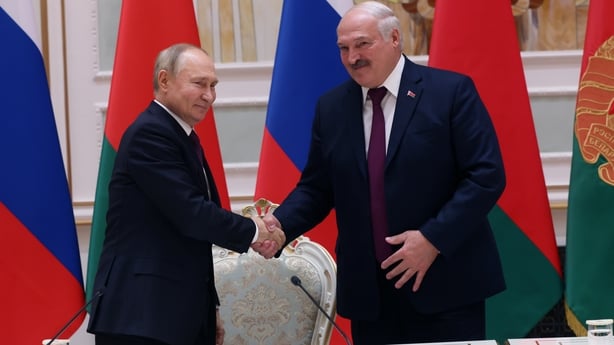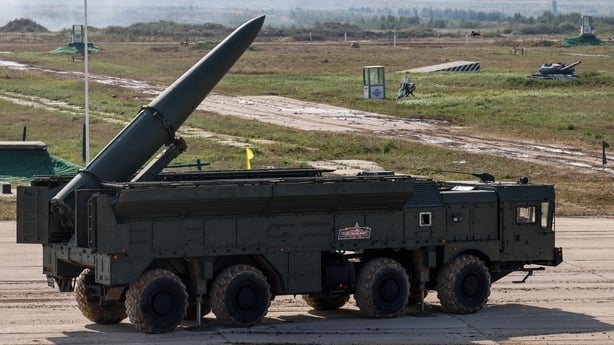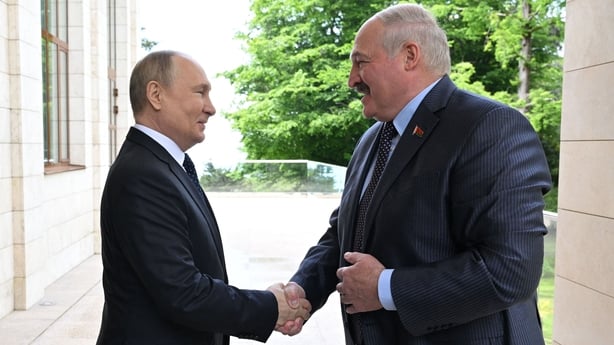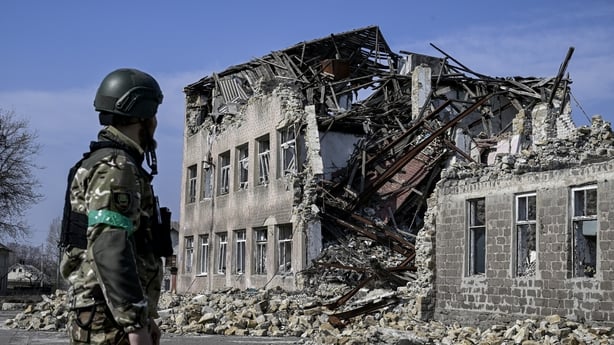The EU's foreign policy chief Josep Borrell has said that Brussels was ready to impose new sanctions on Belarus if Minsk were to host Russian nuclear weapons.
"Belarus hosting Russian nuclear weapons would mean an irresponsible escalation and threat to European security. Belarus can still stop it, it is their choice. The EU stands ready to respond with further sanctions," he tweeted.
It comes as NATO has criticised Russia for its "dangerous and irresponsible" nuclear rhetoric and Ukraine said it was seeking an emergency meeting of the United Nation's Security Council to counter Russia's "nuclear blackmail" of Belarus.

"Ukraine expects effective actions to counteract the Kremlin's nuclear blackmail from the United Kingdom, China, the United States and France," the Ukrainian foreign ministry said.
"We demand that an extraordinary meeting of the UN Security Council be immediately convened for this purpose," it added.
Russian President Vladimir Putin announced on Saturday that Russia would station tactical nuclear weapons in neighbour and ally Belarus "without violating our international agreements on nuclear non-proliferation".
Mr Putin said the deployment was "nothing unusual" and similar to moves from the United States, which stores such weapons in bases across Belgium, Germany, Italy, the Netherlands and Turkey, an analogy western allies called "misleading".
With fears of a nuclear war rising since the invasion, experts believe that any Russian strike would likely involve small-size battlefield weapons, called "tactical" as opposed to "strategic" high-powered long-range nuclear weapons.
The Ukrainian foreign ministry accused Russia of breaching its obligations, and of undermining the "nuclear disarmament architecture and the international security system in general".
It called on "all members of the international community to convey to the criminal Putin regime the categorical unacceptability of its latest nuclear provocations."
'Dangerous and irresponsible'
In the interview broadcast on Saturday, Mr Putin said the move to deploy tactical nuclear weapons to Belarus was "nothing unusual".
"The United States has been doing this for decades. They have long placed their tactical nuclear weapons on the territory of their allies," Mr Putin said.

Mr Putin said he spoke to Belarusian President Alexander Lukashenko and said "we agreed to do the same."
Russia will start training crews on 3 April and plans to finish the construction of a special storage facility for tactical nuclear weapons by 1 July.
Germany and NATO said the analogy was deceptive.
"The comparison made by President Putin to nuclear sharing in NATO is misleading and does not justify the step announced by Russia," an official in German foreign office told AFP.
NATO also joined the criticism, with spokeswoman Oana Lungescu saying "Russia's reference to NATO's nuclear sharing is totally misleading. NATO allies act with full respect of their international commitments."
Ms Lungescu also blasted Russia's announcement as "dangerous and irresponsible".
She however said the Western allies had not yet "seen any changes in Russia's nuclear posture that would lead us to adjust our own."
Analysts at the Washington-based Institute for the Study of War (ISW) said the risk of escalation to nuclear war "remains extremely low".
In Washington, Rep. Michael McCaul, the Republican chairman of the US House of Representatives foreign affairs committee, said he regarded Russia's plans to station tactical nuclear weapons in Belarus as disturbing and designed to intimidate the West.
"Tensions are rising. I think this is saber-rattling on the part of Putin basically to try to frighten," Mr McCaul told the Fox News Sunday program. "These tactical nukes are disturbing."
But the International Campaign to Abolish Nuclear Weapons called Mr Putin's announcement an extremely dangerous escalation.
"In the context of the war in Ukraine, the likelihood of miscalculation or misinterpretation is extremely high.
"Sharing nuclear weapons makes the situation much worse and risks catastrophic humanitarian consequences," it said on Twitter.
Scare tactics
Mr Putin has previously said nuclear tensions were "rising" globally but that Moscow would not deploy first.
Back in February 2022, Belarus allowed Russia to launch its invasion of Ukraine from Belarusian territory.

Fears have since risen that Belarus may join its ally's offensive, but dictator Alexander Lukashenko, a key ally of Mr Putin, said he would do so "only if attacked".
On Sunday secretary of Ukraine's National Security and Defence Council, Oleksiy Danilov wrote on Twitter that "the Kremlin took Belarus as a nuclear hostage."
He added that the move was "a step towards the internal destabilisation of the country".
Ukrainian presidential aide Mykhaylo Podolyak added that "(Putin) admits that he is afraid of losing and all he can do is scare" people.
The Russian leader said renewed discussions with Mr Lukashenko on the issue were spurred by a British official's suggestion that depleted uranium weapons be sent to Ukraine.
Russia has "what it needs to answer" if the West supplied Ukraine with such ammunition, he added.
"Without exaggeration, we have hundreds of thousands of such shells. We have not used them yet."
Battle for Bakhmut
On the battlefield, Ukraine has shown more optimism in recent days about the brutal months-long battle for the eastern city of Bakhmut.
Bakhmut is a major Russian target as it tries to fully capture Ukraine's industrialised Donbas region.

At one point Russian commanders expressed confidence the city would fall soon but such claims have tailed off amid heavy fighting.
Ukrainian forces have managed to blunt Russia's offensive in and around Bakhmut, where the situation is stabilising, commander in chief General Valery Zaluzhniy said yesterday.
The General Staff said this morning Ukrainian forces had repelled 85 Russian attacks over the past 24 hours in several parts of the eastern front, including the Bakhmut area.
